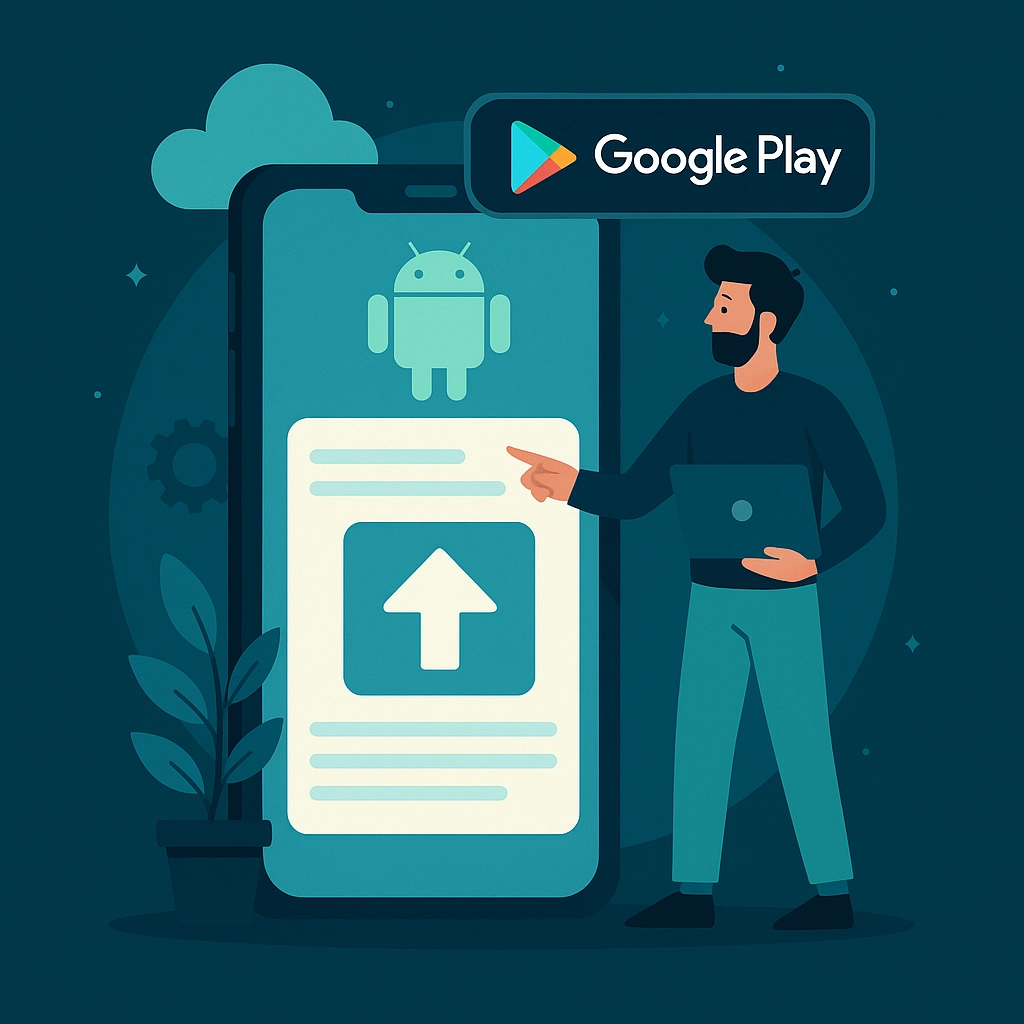
Publishing your Android app can feel complicated — but in 2025, the process is more streamlined than ever.
Whether you’re a freelancer, indie developer, or a digital agency in Pakistan, this guide walks you through the exact steps to upload, review, and release your app successfully.
✅ Step 1: Create a Google Play Developer Account Link to heading
You must have a Google Play Console developer account.
Requirements: Link to heading
✔ Valid Gmail
✔ One-time registration fee: $25
✔ Government ID verification (required in Pakistan)
👉 Sign up here: https://play.google.com/console
✅ Step 2: Complete Developer Profile Verification Link to heading
Since 2023, Google requires:
- Full legal name
- Identity document (CNIC / Passport for Pakistan)
- Address
- Phone verification
Tip: Ensure your name matches your ID exactly to avoid delays.
✅ Step 3: Prepare Your App Release Build (AAB Only) Link to heading
Google no longer accepts APK for new apps.
You must upload:
✔ AAB (Android App Bundle) Link to heading
In Android Studio:
Build → Generate Signed Bundle / APK → Android App Bundle
Upload the .aab file.
✅ Step 4: Create a New App in Google Play Console Link to heading
Go to: All Apps → Create App
Enter:
- App Name
- App Category (Game / App)
- Type (Free or Paid)
- Compliance confirmations (child safety, ads, privacy)
✅ Step 5: Add Store Listing Details Link to heading
Fill in your app information:
Required: Link to heading
- App Title
- Short description (≤ 80 characters)
- Full description
- Screenshots (phone & tablet)
- App Icon (512×512 PNG)
- Feature Graphic (1024×500)
Optional but recommended: Link to heading
✔ Promo video
✔ Tags
✔ Deep links
✅ Step 6: Upload Your App Bundle (AAB) Link to heading
Navigate to:
Production → Create New Release
Upload your .aab file.
Google will analyze it for:
- App size
- Signing
- Compatibility
- Permissions
✅ Step 7: Create a Privacy Policy Page Link to heading
Your website must host a public privacy policy:
✔ HTTPS (your site already uses SSL)
✔ Permanent link
✔ Matches your app’s data permissions
Example:https://shayananique.com/privacy-policy/
✅ Step 8: Fill Out Data Safety Form Link to heading
Google’s Data Safety form is mandatory.
Answer questions about:
- Data collection
- Data sharing
- Encryption
- Data deletion
✅ Step 9: Content Rating Questionnaire Link to heading
Answer rating questions honestly or your app may be:
⚠ Suspended
⚠ Age-restricted
⚠ Unlisted
✅ Step 10: App Testing (Optional but Recommended) Link to heading
You can launch:
- Internal Testing
- Closed Testing
- Open Testing
Testing helps prevent rejection.
✅ Step 11: Submit for Review Link to heading
Once everything is ready → click:
👉 Submit for Review
Review times: Link to heading
- New apps: 3–7 days
- Updates: 1–3 days
🚀 Tips to Get Google Play Approval Faster Link to heading
✔ Use a clean, stable build Link to heading
Avoid sudden crashes or ANR issues.
✔ No copyrighted images Link to heading
Use your own assets.
✔ Ad policy compliance Link to heading
Declare ads in the “Ads” section.
✔ Fill every field in Play Console Link to heading
Incomplete metadata = delays.
✔ Link your privacy policy Link to heading
Google rejects apps without it.
🧠 Bonus: How to Improve Play Store Ranking Link to heading
✔ Use high-quality screenshots Link to heading
Add branding + features.
✔ Include keywords in descriptions Link to heading
Examples:
- “Android app development Pakistan”
- “Secure, fast mobile app”
✔ Collect reviews Link to heading
Ratings help visibility.
🔗 Internal Links for SEO Link to heading
You may also like:
- Top Cybersecurity Tools Every Developer Should Use in 2025
- Choose the Right Web Development Stack for 2025
- Cloud Security Best Practices for 2025
🎉 Final Thoughts Link to heading
Publishing an Android app in 2025 is easier when you follow the official structure.
If you need help with:
✔ Google Play Console
✔ App signing
✔ Security hardening
✔ Store listing optimization
You can request expert support anytime.
Written by: Shayan Anique Akhtar
IT Consultant & Cybersecurity Specialist